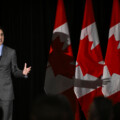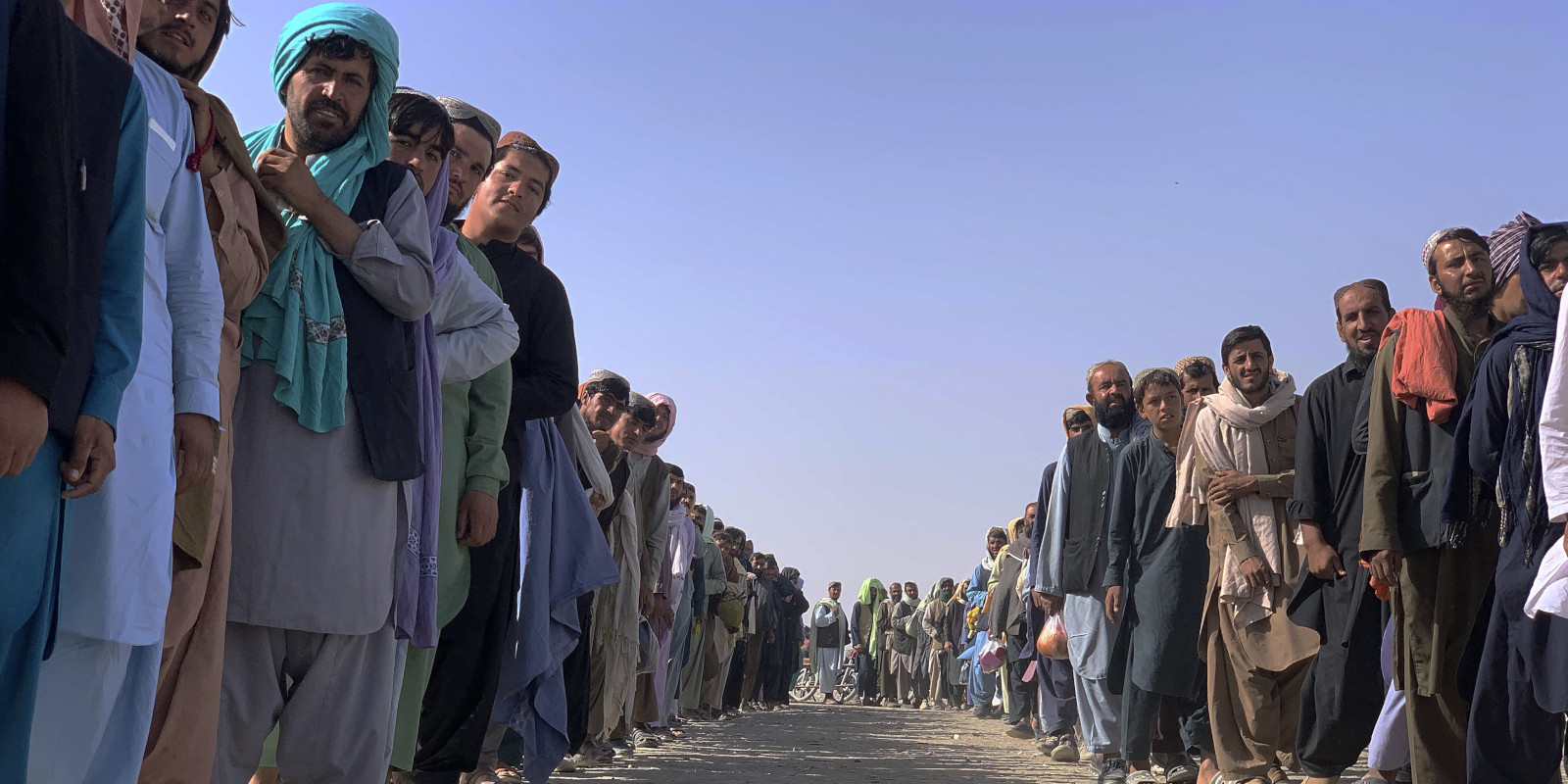Welcome to The Hub’s Federal Election 2021 Policy Pulse, where we’ll be tracking all the policy announcements from the major parties, with instant analysis from our crew of experts.
With the election scheduled for Sept. 20, we’ll be monitoring 36 days worth of policy ideas, so watch out each morning for the day’s live blog where we’ll be tracking every announcement as it happens.
5:45 p.m. — Daily recap: Liberals promise to fund provincial vaccine passport systems
The Liberals promised to fund provincial vaccine passport systems and the Conservatives announced a plan for enhanced sickness benefits. Here’s the rundown, with more news and analysis below.
- Liberal leader Justin Trudeau was in Mississauga to promise a $1 billion fund for provinces that create a vaccine passport system and $100 million to study the long-term health effects of COVID-19.
- Conservative leader Erin O’Toole was in Newfoundland this morning to announce an increase in employment insurance sickness benefits. The current limit of 26 weeks will be boosted to 52 weeks, which will provide a safety net for people undergoing treatment for serious illness, said O’Toole.
4:15 p.m. — Canada will continue to help people in Afghanistan
Since yesterday’s deadly bombing, international evacuations have continued, especially by the US.
The count of people who died and injured In yesterday’s attack has been updated: more than 170 Afghans and other nationals, including 13 U.S. service members have died, and at least 180 people were injured.
U.S. President Joe Biden has been advised of more potential terrorist attacks as the mission comes to a rapid close.
Below are the updated approximate totals of evacuees per country:
- US: 105, 000+
- UK: 13,700+
- Germany: 5,347
- Italy: 5,011
- Australia: 4,100
- Canada: 3,700+
- France: 2,600+
- Netherlands: 2,500+
- Spain: 2,206
- Turkey: 1,400
In a press conference yesterday, Biden said the following: “We will not forgive. We will not forget. We will hunt you down and make you pay.” ISIS-K took responsibility for the bombing.
The President has since ordered the Pentagon to “develop operational plans to strike [ISIS-K] assets, leadership and facilities.”
It is believed the Taliban is not responsible for the attack. Questions now surround whether the US will work with the Taliban to target ISIS-K.
There are big challenges ahead including reports that al Qaeda operatives have been set free in recent weeks. At the moment, the Haqqani network, a group that mediates between al Qaeda affiliates and the Taliban, is highly influential in Kabul.
As for Canada, Immigration Minister Marco Mendocino told reporters that the government is “going to continue to exhaust every option” to help people to leave Afghanistan. Foreign Affairs Minister Marc Garneau said Canada had secured 500 seats on an American airlift yesterday and are now out of Kabul.
Canada is working and coordinating with regional partners to put pressure on the Taliban to allow people to leave. The Canadian government has also expediate the visa process for Afghans who worked with the CAF. Mendocino stressed the visas that his department has approved for Afghans will remain valid, even if they are in a third country.
In an official statement, Prime Minister Justin Trudeau strongly condemned the terror attack near Hamid Karzai International airport.
3:30 p.m. — Canada’s peacekeeping missions suffer from a lack of public attention, experts say
The Hub’s associate editor Amal Attar-Guzman looks at two of Canada’s major peacekeeping missions:
Canada’s peacekeeping missions in the Balkans are suffering from a lack of resources and public attention, argued foreign policy experts at a Macdonald-Laurier Institute webinar yesterday.
The panel explored concerns about the state of Canada’s interests in the Balkan region and threats directly posed by Russia and increasingly indirectly by China.
With these challenges, and as the U.S. is steadily pivoting its attention and resources away from the region, “Canada and its allies [will] need to pay closer attention to the region,” said Balkan Devlen, a senior fellow at the Macdonald-Laurier Institute, who moderated the panel.
Currently, Canada is involved in peacekeeping missions in the Balkans. Two main missions are in Latvia (Operation REASSURANCE) and Ukraine (Operation UNIFIER). In the former mission, Canada contributes in NATO collective defence and allied solidarity, and in Operation UNIFIER, Canada is involved in training of security services, democracy and governance, and institutional development. Canada is deeply invested in the missions, especially Ukraine, said Jill Sinclair, the Canadian representative to the Ukraine Defence Reform Advisory Board.
Despite some progress, there are still ongoing challenges. The first is the lack of resources and investment. Canada has shown commitment to Latvia and NATO but at the moment there is a need of greater capabilities, said Christian Leuprecht. With a lack of financial investment and resources, NATO and Canada cannot expand its capabilities and initiatives can only go so far.
The second challenge is the lack of Canadian public knowledge of these missions, said Roman Wachuk, the former Ambassador of Canada to Ukraine. Though very important, they do not garner the same amount of attention as immediate crises or disasters. Because these missions are running smoothly and are not new, they “do not attract policymakers and practitioners.” As a result, Canadian and Balkan interests are sidelined and as a result make them susceptible to Russian geopolitical threats.
The third challenge is the lack of concern about Russia’s attempts to subvert western democracies — from the 2016 U.S. presidential elections to COVID-19 disinformation operations in Canada, and ongoing activities in the Balkan states, such as the 2007 cyberattacks against Estonia, said Marcus Kolga, a senior fellow at Macdonald-Laurier Institute
So, what can Canada do to defend its interests and protecting allies in the region? First, Canada can invest more money and resources to increase capabilities in peacekeeping missions and NATO. Second, the Canadian government can clearly express the geopolitical and moral importance of these missions to the Canadian public including why NATO matters for our national interests.
And third, Canada needs to do a much better job of learning from its eastern allies. These states, Ukraine and Latvia especially, face daily threats and constant attacks from Russia. Because of that, they are prepared to protect their institutions. Canada can learn a lot from them to protect its own democratic institutions at home.
With the current and upcoming challenges in mind, Canada and its allies must be prepared.
If you want to watch the full webinar, you can watch it here.
2:30 p.m. — Party leaders should move beyond the ‘incrementalism’ that has defined Indigenous policy
After a week-and-a-half of mostly flying under the radar, Indigenous issues are starting to get some attention on the campaign trail this week.
And with government buildings continuing to fly the Canadian flag at half-mast since unmarked graves were discovered outside a former Kamloops Residential School three months ago, Conservative leader Erin O’Toole was asked when it might be time to raise them again.
“We as Canadians owe it to the families and to First Nations to provide a path to healing. It’s not a time to tear down Canada, it’s a time to recommit to build it to be the country we know it can be,” said O’Toole.
O’Toole said he has met with Indigenous leaders since becoming party leader and that, in government, reconciliation will be important to him.
The next government will need to make progress on a wide range of issues affecting Indigenous peoples including housing and infrastructure, education and employment.
A new report by Ken Coates, the Munk senior fellow in Aboriginal and Northern Canadian issues at Macdonald-Laurier Institute, sets out a framework for dealing with these issues that will “strive to move past the incrementalism that has defined Indigenous policy for generations.”
Some recommendations include:
- Set all Indigenous policy under the common goal of improving government services and infrastructure to the national standard.
- Commit to negotiating more self-government agreements with those communities that are interested in such arrangements.
- Fundamentally overhaul the federal government’s approach to resolving legal disputes, seeking inspiration from solutions such as New Zealand’s Waitangi Tribunal.
- Consider additional land and resource transfers to Indigenous peoples, as has already occurred in Northern Quebec, the Yukon, and the Northwest Territories.
- Develop a fair and transparent process to better tie funding for Indigenous governments to the general development of the Canadian economy, with local Indigenous authorities ultimately setting priorities for how to allocate their own budgets.
It’s a radical change, but in the wake of the recent discoveries at residential school sites, Coates believes the country is ready for it.
1:00 p.m. — With vaccine passports on the way, who are the people who haven’t gotten shots?
L. Graeme Smith, The Hub’s content editor, takes a look at some polling on vaccine hesitancy:
Liberal leader Justin Trudeau’s promise of a $1 billion fund to help provinces and territories to create vaccine passport was presented as much as a way to induce the vaccine hesitant to get their jabs as it is to enable the vaccinated to go about their lives with minimal further restrictions.
Currently, about 73 percent of Canadians have received at least one dose (and about 84 percent of eligible Canadians older than 12), and about 66 percent of Canadians are fully vaccinated (and about 76 percent of eligible Canadians). After a slow start in our vaccine procurement efforts, these numbers are now the best in the G7.
But who are those who have still not gotten their shots?
A Public Policy Forum report from May, Reaching the Vaccine Hesitant, provided data on who is likely to still be holding out, as well as insights on how we can better reach them.
The study found that concern about COVID-19 was the highest single factor influencing vaccine willingness. Trust in institutions also matters, as those who exhibit signs of anti-intellectualism are markedly less likely to be willing to be vaccinated. Though comparatively smaller in effect, reading news about COVID-19 is positively associated with willingness to be vaccinated while being misinformed is negatively associated with willingness.
Overall, those with a higher income and/or more education are more willing to be vaccinated, as well as those living in urban areas (although the author notes that the effect of living in a rural place is measurably reduced once accounting for attitudinal differences between individuals).
Age is weakly correlated with willingness (with the higher age groups more willing), while being female is negatively correlated, particularly after taking account of non-demographic factors.
In addition, racialized people indicate a statistically significant lower willingness to be vaccinated than non-racialized people.
What is the sum of these various demographic and other characteristics?
Bruce Anderson, of Abacus Data, has described the average vaccine hesitant Canadian as someone about age 42, who describes themselves as in the centre ideologically.
“If they were voting in a federal election today, 35 percent would vote Liberal, 25 percent Conservative, 17 percent NDP, 9 percent Green — pretty similar to overall voting intentions for the entire population. However, compared to the vaccinated, they don’t have a lot of trust in government,” Anderson wrote.
The Liberal Party’s focus on vaccine-related issues (including mandates and passports) seems to be banking on the public at large running out of patience and sympathy for those who are still unwilling. Recent data shows that may indeed be right.
Polling from the Angus Reid Institute highlights that three-quarters of Canadians (75 percent) say they have “no sympathy” for unvaccinated individuals who contract COVID-19. This number is 83 percent among fully vaccinated Canadians.
As for how to induce higher vaccination rates, again three-quarters of Canadians support the use of regulations — even including mandatory vaccinations in order to enter certain public spaces in their province — as a way to convince the unwilling.
One-third (33 percent) of those who intend to support the Conservatives in the coming election, however, oppose the use of either incentives or regulations at all.
12:00 p.m. — Several provinces are tackling health-care backlogs with private options. The results are good
The Hub’s editor-at-large Sean Speer takes a look at health-care backlogs after the pandemic:
Today Liberal Party leader Justin Trudeau announced new, pandemic-related funding for the provinces and territories, including $100M to study the long-term health impacts of COVID-19.
While the pandemic will doubtless have various long-term effects (including for vulnerable populations and children as the Liberal policy backgrounder observes), one of the biggest may be to provincial and territorial health-care systems themselves in the form of significant, pandemic-induced backlogs.
These backlogs are a result of health authorities scaling back normal health-care services — including surgeries and testing — in order to dedicate attention and resources to COVID-19 caseloads. Some observers have described them as the “crisis behind the crisis.”
Take Ontario for instance. The Financial Accountability Office of Ontario has estimated the province’s backlog may reach nearly 420,000 for surgical procedures and 2.5 million for diagnostic tests by next month.
But these numbers may not even tell the full story. As the pandemic subsides and people return to normal health-care consumption, we may discover “an invisible wait list” that results from delayed diagnosis, testing, and treatments. Consider, for instance, the Quebec government has reported a 24-percent drop in requests to be placed on a surgical wait list during the pandemic compared to a non-pandemic year.
Eliminating these backlogs will take years and cost billions of dollars. The risk is that, in the meantime, Canadians face significant health consequences in the form of delayed diagnoses and treatment, protracted suffering, and even death.
Several provinces, including Alberta, British Columbia, and Quebec, are leveraging private delivery options to augment the capacity of the public health-care system to reduce their surgical wait times.
Early signs are generally positive. The B.C. government, for instance, reported that as of March 2021, it had delivered surgeries to 97 percent of the 15,154 patients who surgeries were postponed during the first wave of COVID-19.
It is important to emphasize that this use of private health-care providers to boost provincial health-care capacity is being paid for by public insurance and isn’t compromising the principle of universality. That it involves a combination of governments from across the political spectrum (from the NDP in British Columbia to UCP in Alberta) is a sign that it’s being driven by pragmatic concerns rather than ideological ones.
This, of course, stands in stark contrast of the political rhetoric thus far on the federal election campaign which has suggested that any form of private service delivery ought to be fully prohibited from provincial and territorial health-care systems.
Perhaps one of the positive outcomes of the study proposed by the Liberal Party is that our federal party leaders would gain a better understanding of how provincial and territorial health-care systems work and well-regulated private health-care providers can be a boost, not a blow, to both the efficiency and equity of health care in Canada.
11:00 a.m. — Navigating the legal grey zone of vaccine mandates
Liberal leader Justin Trudeau announced a new fund to help the provinces create vaccine passports this morning. Although the passport model doesn’t quite go as far as a government-imposed vaccine mandate, it does raise one of the biggest questions remaining for a post-COVID world: how much of everyday life will involve showing proof of vaccination? And how would the courts feel about the imposition of vaccine mandates?
The short answer is that it’s complicated.
Earlier this month, Gerard Kennedy, an assistant professor in the faculty of the law at the University of Manitoba, explained the nuance behind the legality of vaccine mandates:
The number of Canadians vaccinated against COVID-19 may be insufficient to guarantee a return to normal life. An obvious way to encourage higher vaccine take-up is restricting the liberty, including taking away the jobs, of the unvaccinated. But with few, if growing exceptions, politicians, as well as other decision-makers such as university presidents and business leaders, have been reluctant to pursue this route.
But this legal grey zone can become black-and-white. Governments can pass legislation, regulating use of vaccine mandates, noting where they are to be: mandatory (e.g., staff front-line heath care, elementary schools); permitted (most places); and prohibited (e.g., customers at grocery stores, pharmacies). Exceptions should, of course, be made for those who cannot be vaccinated, such as if they are too young, undergoing chemotherapy, or are otherwise immuno-compromised.
And this legislation should be crafted by invoking section 33 of the Canadian Charter of Rights and Freedoms, also known as the “notwithstanding clause”.
Read the full column at The Hub.
9:40 a.m. — Trudeau promises $1 billion fund for provincial vaccine passport systems
Liberal leader Justin Trudeau was in Mississauga this morning to promise a $1 billion fund for provinces that create a vaccine passport system. Trudeau also pledged $100 million to study the long-term health effects of COVID-19.
9:35 a.m. — O’Toole announces plan for enhanced sickness benefits
Conservative leader Erin O’Toole was in Newfoundland this morning to announce an increase in employment insurance sickness benefits.
The current limit of 26 weeks will be boosted to 52 weeks, which will provide a safety net for people undergoing treatment for serious illness, said O’Toole.
7:00 a.m. — Where the leaders are today
Liberal leader Justin Trudeau will make an announcement at 9 a.m. in Mississauga.
Conservative leader Erin O’Toole will be in Newfoundland to make an announcement at 11:00 a.m. local time (9:30 a.m. ET).
NDP leader Jagmeet Singh will be in Thunder Bay to make an announcement at 9:30 a.m. ET.
Recommended for You

The Notebook by Theo Argitis: Carney’s One Big Beautiful Tax Cut, and fresh budget lessons from the U.K.

Ginny Roth: How vacant liberal nationalism left Canada worse off than George Grant even imagined

Peter Menzies: Justin Trudeau’s legislative legacy is still haunting the Liberals

‘Our role is to ask uncomfortable questions’: The Full Press on why transgender issues are the third rail of Canadian journalism



